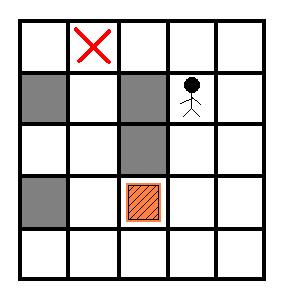HDU1254-推箱子
来源:互联网 发布:匹克模考tpo软件 编辑:程序博客网 时间:2024/06/09 13:05
推箱子
Time Limit : 2000/1000ms (Java/Other) Memory Limit : 65536/32768K (Java/Other)
Total Submission(s) : 71 Accepted Submission(s) : 31
Font: Times New Roman | Verdana | Georgia
Font Size: ← →
Problem Description
推箱子是一个很经典的游戏.今天我们来玩一个简单版本.在一个M*N的房间里有一个箱子和一个搬运工,搬运工的工作就是把箱子推到指定的位置,注意,搬运工只能推箱子而不能拉箱子,因此如果箱子被推到一个角上(如图2)那么箱子就不能再被移动了,如果箱子被推到一面墙上,那么箱子只能沿着墙移动.
现在给定房间的结构,箱子的位置,搬运工的位置和箱子要被推去的位置,请你计算出搬运工至少要推动箱子多少格.

现在给定房间的结构,箱子的位置,搬运工的位置和箱子要被推去的位置,请你计算出搬运工至少要推动箱子多少格.

Input
输入数据的第一行是一个整数T(1<=T<=20),代表测试数据的数量.然后是T组测试数据,每组测试数据的第一行是两个正整数M,N(2<=M,N<=7),代表房间的大小,然后是一个M行N列的矩阵,代表房间的布局,其中0代表空的地板,1代表墙,2代表箱子的起始位置,3代表箱子要被推去的位置,4代表搬运工的起始位置.
Output
对于每组测试数据,输出搬运工最少需要推动箱子多少格才能帮箱子推到指定位置,如果不能推到指定位置则输出-1.
Sample Input
15 50 3 0 0 01 0 1 4 00 0 1 0 01 0 2 0 00 0 0 0 0
Sample Output
4
Author
解题思路:bfs+dfs,对箱子进行bfs,对人进行dfs
#include <iostream>#include <cstdio>#include <string>#include <cstring>#include <algorithm>#include <queue>#include <vector>#include <set>#include <bitset>#include <stack>#include <map>#include <climits>#include <functional>using namespace std;#define LL long longconst int INF=0x3f3f3f3f;int xx[8]={-1,0,1,0,-1,0,1,0};int yy[8]={0,-1,0,1,0,-1,0,1};bool mp[10][10][5];int a[10][10],b[10][10];int x1,y1,x2,y2,tx,ty,px,py;int N,M;bool flag;struct node{ int x,y,px,py,step;}n,m;bool dfs(int x,int y){ if(x==tx&&y==ty) return true; if(x<0||x>=N||y<0||y>=M) return false; if(x==m.x&&y==m.y) return false; if(b[x][y]==1||a[x][y]==1) return false; b[x][y]=1; return (dfs(x+1,y)||dfs(x-1,y)||dfs(x,y+1)||dfs(x,y-1));}int main(){ int t; scanf("%d", &t); while(t--) { scanf("%d %d", &N, &M); for(int i = 0; i < N; i++) { for(int j = 0; j < M; j++) { scanf("%d",&a[i][j]); b[i][j]=a[i][j]; if(a[i][j]==2) x1=i,y1=j; if(a[i][j]==3) x2=i,y2=j; if(a[i][j]==4) px=i,py=j; } } memset(mp,false,sizeof mp); flag=false; n.x=x1;n.y=y1;n.step=0; n.px=px;n.py=py; queue<node>q; q.push(n); while(!q.empty()) { m=q.front(); q.pop(); if(m.x==x2&&m.y==y2) { flag=true; break; } for(int i=0;i<4;i++) { n.x=m.x+xx[i]; n.y=m.y+yy[i]; tx=m.x+xx[i+2]; ty=m.y+yy[i+2]; n.step=m.step+1; if(n.x>=0&&n.x<N&&n.y>=0&&n.y<M&&!mp[n.x][n.y][i]&&a[n.x][n.y]!=1) { memset(b,0,sizeof b); if(tx>=0&&tx<N&&ty>=0&&ty<M&&a[tx][ty]!=1&&dfs(m.px,m.py)) { n.px=tx;n.py=ty; mp[n.x][n.y][i]=true; q.push(n); } } } } if(flag) printf("%d\n",m.step); else printf("-1\n"); } return 0;} 0 0
- hdu1254 推箱子
- hdu1254推箱子
- hdu1254推箱子(BFS)
- hdu1254推箱子
- hdu1254推箱子
- hdu1254 推箱子
- HDU1254推箱子(AC)
- hdu1254 推箱子
- 推箱子 hdu1254
- hdu1254 推箱子--BFS
- HDU1254推箱子
- HDU1254-推箱子
- 推箱子 HDU1254
- hdu1254 推箱子
- hdu1254 推箱子 (bfs+dfs)
- HDU1254 推箱子 双BFS
- hdu1254 推箱子 【bfs+dfs】
- HDU1254 推箱子(BFS)
- 动态规划之背包问题
- 变态跳台阶
- install rbx1 and ROS工具包和Rviz仿真器
- Intervals poj 3680 最小费用最大流
- 盒子模型(一)
- HDU1254-推箱子
- Xcode SVN配置方法
- 数据结构之排序算法(一)
- 434. Number of Segments in a String#1
- word2vec中一种模型的理解
- java编程思想读书笔记-第十五章 分布式计算
- PID
- Caffe学习系列(9):运行caffe自带的两个简单例子
- 跳台阶


